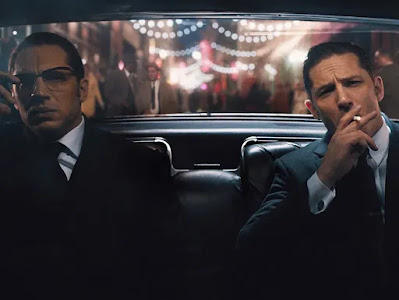Technically, we've already had the British telling of the Kray twins' legend: shot by Peter Medak in 1990, at the end of the Thatcher years (when both Ronnie and Reggie were still alive, if hardly active), with Spandau Ballet faces Martin and Gary Kemp in the lead roles. Legend offers the 21st century international retelling: produced by broad-brush populists Working Title (Notting Hill), directed by the mid-ranking American filmmaker Brian Helgeland (Payback), and boasting a saleable casting coup/special effect in having tough guy du jour Tom Hardy play both Krays simultaneously. What this version gains in scale and slickness, it loses in grit, darkness and specificity. Much of that was lost in the meeting when Helgeland and the WT execs elected to couch the new film as a romance of sorts, in a bid to pull in girlfriends as well as the Kray-fixated wifebeaters. That's right: they've made a date movie about two of the most violent men ever spat out onto the streets of the East End.
Wafting perfumed notes into what could have been a flatulently male universe, Legend proceeds from the POV of Reg's first wife Frances Shea (Emily Browning) - whom the gangster wooed, when she was just a sweet sixteen, by swiping a lemon sherbet from between her lips; later, we see him tossing a bagful of replacements up at her bedroom window, offering a decent return on her investment - and establishes a love triangle between the girl, the goon and his work. In this configuration, gay brother Ron - seen shepherding rent boys into a trailer in the woods, like the wild man he may very well have been - represents those unruly instincts that tend to do for any relationship, business or personal. (You could go further, although here, as elsewhere, Helgeland treads lightly: that Ron, mired in the homoerotic, posed some kind of threat to Reg's heteronormativity.)
That this Kray-Kray caper has more than half an eye on overseas revenues can be seen from Helgeland's rather half-hearted inclusion of the boys' dealings with Meyer Lansky associate Angelo Bruno (Chazz Palminteri): a subplot that appears to have been lost somewhat in the edit, and now looks to all the world like a weedily reconstituted version of the recently reissued The Long Good Friday's transatlantic antagonism. It's also apparent from the tendency to keep quality British actors hanging round on the sidelines in what aren't much more than recurring bitparts. David Thewlis manages a nice, sustained line in seediness as a consigliere with the tremendously humdrum name of Les Payne, but Paul Bettany is barely present (and goes uncredited) as Charlie Richardson, Tara Fitzgerald has but three disapproving lines as Frances's mother, and Christopher Eccleston struggles to find the material to gain a toehold as copper "Nipper" Read.
In part, this is because Legend has been conceived (and is being sold) as the Hardy show. While the actor does a very decent job of distinguishing the twins' personalities - the sitcommily uptight, variably coherent Ron, the super-smooth, forever-together Reg - I sensed he was retreading the Bronson line of turning the Krays into quote-unquote characters rather than getting to the truth of them as ugly, violent men. Only in the dying moments do you sense Legend interrogating the idea these might be two warring sides of the same warped psyche: cinephiles may wish Helgeland had sat down at some point during preproduction and treated himself to the Jerry Lewis version of The Nutty Professor, a fifty-year-old comedy which - somewhat unexpectedly - bears comparison as by far the more piercing, adult and perceptive work.
This is, however, of a piece with the film's approach to violence, which - whether observing the Richardsons' kangaroo court, tooled-up bar brawls or two minor players, the Rosencrantz and Guildernstern of this scene, placing bets on which Kray will stay on his feet the longest during a fraternal dust-up - leans towards the knockabout and clownish, lest it put off more screamish popcorn-munchers. (Carter Burwell's pastichey score, twanging ironically through "Maybe It's Because I'm a Londoner", does as much as anything to take the edge off the drama.) Helgeland has spoken of "stripping out the extremes" in order to get closer to what he believes was the truth, yet that leaves us with a Kray movie in which, for three-quarters of the running time, nobody gets hurt, let alone "disappeared" or offed; in which Ronnie and Reggie are depicted as really no more than roguish carnival barkers.
Legend remains watchable, handsome in its recreation of turn-of-the-60s clubland (sharp suits, smoky rooms, Duffy on hand as the resident chanteuse), far from the worst option you'll face at the box office this weekend, and yet it's naggingly glib, far more comfortable showing the power the Krays held over people than it is about examining it. (This may be a consequence of taking as your narrator a woman who found one of the brothers attractive enough to jump into bed with him, and then stay with him through several stretches behind bars.) Back in 1997 - not long after that first Krays film - Helgeland's screenplay for L.A. Confidential demonstrated it was possible for a mainstream movie to drill down into the rot and corruption of criminal infrastructures without alienating the audience; Legend, very much a Kray movie for the Guy Ritchie age, would rather skate across the surface than lay a finger on the mythology and psychology that perpetuated this empire. It is, like many a foreigner on the streets of East London over the years, running ever so slightly scared.
Legend opens in cinemas nationwide tomorrow.

No comments:
Post a Comment